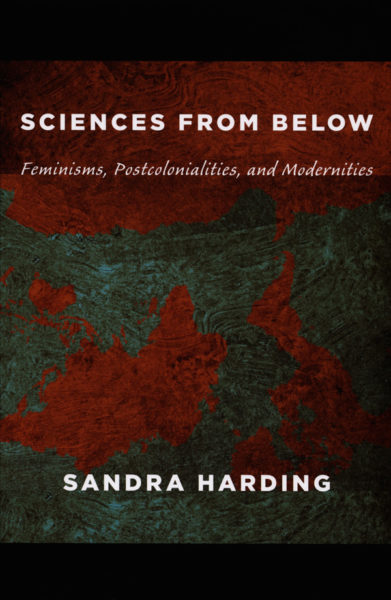Science Against the Status Quo
A Review of Sandra Harding’s Sciences from Below: Feminisms, Postcolonialities, and Modernities
By Sara Giordano and Angela Willey
Volume 23, number 1, Science Under Occupation

The legacy of Sandra Harding’s contributions to theorizing “Science Under Occupation” is profound. For more than four decades now, Harding has famously insisted that a world of sciences (lower case and plural) exist, and that the mythic status of a singularly objective “Science” is the fruit of colonial knowledge politics.1 In rigorous analysis of the specificity of the Science that counts, she has provided resources for seeing the racist, sexist, and Judeo-Christian assumptions undergirding Northern positivist epistemologies and knowledges. She has also called for more sciences. Sciences that start from vantage points from which the pre-theoretical assumptions of (Northern) Science seem strange. Sciences that start from somewhere, rather than pretending to represent no one’s interests. Sciences interested in epistemic and material redistribution. Sciences from Below.
While it comes later in Harding’s long career in the feminist and postcolonial study of science, Sciences from Below reminds us that the knowledge projects that have been categorically excluded from Science, while diverse in form and content, share a common status, and so have a shared interest in epistemic redistribution: the dismantling of the myth of Northern positivism. Harding’s focus on “lives” centers the stakes of epistemological debate: knowledge comes from and impacts lives. How we distribute faith in knowers has lasting material consequences. In a political moment where the left is oft compelled to defend Science (as a self-evident monolith), it is worth remembering that reconsolidating its authority is only a short-term win.2
We had the opportunity to talk with Harding while we were reviewing the book, and she told us that comrades from Science for the People in the early 1970s were among the first to challenge her to think more radically about what an analytic philosopher might bring to the movement. Harding took seriously the conviction that to teach epistemology was to shape our political futures. Her contributions to showing how what counts as objective is tied to the reproduction of the status quo are profound. It struck us in conversation that Harding is always thinking about what one can contribute to movement work with the resources at their disposal. Sciences from Below embodies this spirit.
Harding begins Sciences from Below by arguing that “[e]ven purportedly progressive scientific and technological projects, in the North and the South, are doomed to fail when they do not critically engage with the specters of modernity.” For those of us who are already looking at science as a cultural institution rather than the purely objective practice of observing the natural world, Harding challenges us to “usefully become much more controversial.” By “controversial,” she means doing academic work that causes public debate. She writes “more controversial” to acknowledge the controversy caused by the so-called Science Wars, which continues to be felt throughout society at large.3 The Science Wars centered around questions of the im/possibility of pure scientific objectivity. Harding urges us to do more of this kind of public-reaching scholarship. Her choice of “useful” is intentional and important because it signals a larger point that she makes in both her writings and in person: that we need to think strategically about how we engage science and technology, because knowledge is always political. Harding, like many scholar-activists, is concerned with Science’s roles in the production and maintenance of an unequal society. By being “more controversial” in the way we push both our scientific practices and our (connected) critiques of science, we can restructure our sociopolitical landscape.
Becoming more controversial at a moment when Science is under attack from conservative spheres, stronger globally than they have been in a long time, might mean challenging the binary logics of conservatism/fascism vs. science/modernity, rather than propping up the latter. In this moment, many who have long been critical of Science for its history of racism and sexism have retreated to a position of defending it against conservative attacks. Some have even argued that critiques of objectivity from feminists and others have led to the attacks on “truth” that we are witnessing under Trump. Instead, many of us argue that we need to make more public our vast scholarship on how to move forward with critical, decolonial, feminist science projects that always acknowledge the historical and cultural situatedness of researchers and the research produced.
Harding breaks the book into three sections, each with three chapters. The first section sets the stage by illustrating three different ways in which scholarship in science and technology studies (STS) has suggested new paths forward for scientific knowledge production that reckon insufficiently with the problem of modernity. This oversight, she argues, reproduces an unequal distribution of benefits and harms. Across a large political spectrum, we seem to agree that science should enhance wellbeing. The problem, which Harding emphasized during our conversation, is that when science makes lives better, it is usually those people’s lives which are “already better.” For example, innovations in medical care only benefit those who can access them. The same science often negatively impacts those whose lives are already undervalued. For example, old services may become unavailable once they are no longer needed by those with access to newer ones. At the same time, once a medical fix is practiced, those who cannot or choose not to access it are further marginalized as abnormal.4
Each of the three chapters tackles an important and highly influential set of scholarship suffering from these shortcomings—the work of Bruno Latour, Ulrich Beck, and a research team headed by Michael Gibbons, Helga Nowotny, and Peter Scott (referred to as GNS throughout the text). While Latour’s work has been extremely generative in STS, its influence on the field has also been criticized for marginalizing feminist perspectives and discounting other (specifically non-white, non-male) genealogies of STS.5 Harding suggests that Latour’s work dismisses difference in dangerous ways. His version of democratic consensus making, for example, privileges the individual over constituencies. These critiques of “identity,” Harding argues, lead Latour to re-center dominant groups. For example, in his title We Have Never Been Modern, Latour’s use of “we” ignores first, that many have never been considered modern, and second, that many who have been denied the label of modern have known that “we” (white, male-dominant culture) have not adhered to the progressive goals of modernity. She insists that Latour’s way forward criticizes modernity, but reinvigorates Enlightenment ideals in assuming we can fairly distinguish facts from values while rejecting identity-based social movements which have long called attention to whose knowledge is valued and how these value systems impact the production of our realities.
Ulrich Beck’s work focuses on how progressive movements (specifically environmental movements) reflexively use status quo Science without realizing that scientific enterprises continuously reshape the world to come out on top. Beck argues that modern sciences have created problems that they are then employed to fix, thereby maintaining epistemic authority and power. Harding argues that while this is an important intervention into activists’ relationships with Science, once again, his work fails to ask who has the knowledge needed to change our current inequities. According to Harding, “Beck seems to think that it is Northerners who will create the new world for which he calls.”
Finally, Harding’s critique of GNS’s work is that it shows a similar lack of engagement with feminist and postcolonial critiques. They miss the ways that “power relations of race, class, gender, and imperialism have already shaped the sciences and technologies we have and the societies that have co-evolved with these.” Therefore, ignoring these axes of difference and assuming that we can simply do better, more just science will not work.
While Harding’s appreciation of these three bodies of work is clear, her insistence on interrogating the “we” of STS, and ultimately on knowledge from below, is unwavering. As she said in our interview: “We [Northern STS] aren’t going to fix this [Science’s role in perpetuating inequality]. We are part of the problem.” She explains that this is why over the last few years she has focused her energies on expanding the reach of Latin American STS through her work with the journal Tapuya.
In the book’s second section, “Views from (Western) Modernity’s Peripheries,” Harding presents key insights from what she calls Northern Feminist Science Studies (ch 4) and Postcolonial Science and Technology Studies (ch 5) to articulate the need for a Postcolonial Feminist STS (ch 6). For newcomers to these fields, the chapters of this section provide a handy primer on critiques of sexism and epistemic imperialism in Science and some of the limits of those interventions. Harding addresses the Eurocentric assumptions of Northern feminist science studies, as well as insights from postcolonial STS, and finally makes a call for STS that begins from a Third World feminist “standpoint.” Standpoint epistemology—which Harding describes as “starting from lives”—is a core methodological project in this book and others over Harding’s long career. In its broadest sense, standpoint epistemology offers a way of redressing the myth of a view from nowhere, replacing it with a somewhere specific, an interested community of someones, a political perspective.
In the third section, Harding intervenes in the modern/traditional binary in STS, arguing that even when we critique modern sciences, we often retain an idea that what counts as science has to be rational and objective (even in updated versions of the concept), and has to take place in proper sociopolitical spheres, such as laboratories or policy forums. She argues that, because these entrenched assumptions about how and where science should take place categorically exclude knowledges produced by means and in locations that don’t count as modern, women and racially and geographically marginalized knowers are often not seen as contributors to scientific knowledge. What counts as Science, and when and where it does, is always political. Harding cautions against a reversal of the value ascribed to the constitutive parts of this binary, insisting that there is no “traditional” apart from the “modern.” She rehearses a familiar but important argument for not romanticizing the idea of tradition or the past: the idea that pre-colonial or pre-capitalist contexts were free of power normalizes certain kinds of violence while challenging others. Further, the binary embodies a racist evolutionary temporality that imagines that some people and places can stand in for the past—that some humans and their societies have not changed significantly over the last five hundred years, while others are ever-evolving. Harding argues that we should consider the multiplicity of the modern by focusing on the many modernities operating at the same time.6
In Sciences from Below, as elsewhere, Harding leaves us with the conviction that what has been considered “private,” outside the realms of both science and politics, matters as a site of knowing and a site of change. Concepts like “households” and “lives” represent the spaces and moments in which the impacts of epistemic violence are made material and felt. The redistribution of Science’s harms and benefits must begin from vantage points where the impacts of those harms are visible. Who knows, how, and where is inextricably tied to what is known; Science can’t be made better without attention to knowledge politics. Epistemic redistribution is at the heart of economic and social transformation. What counts must always be questioned—and science(s) for the people must always be plural.
Note: In the decade-plus since Sciences from Below was published, Harding and others have taken up its key insights in seemingly endless ways. The project of theorizing what methodologies, approaches, epistemological frames, funding structures, and sites might lend themselves to knowing differently—to feminist, decolonial, democratic, queer, or otherwise better or more accountable sciences—is indeed exploding, in journals and creative works, at conferences, and in the proverbial streets. Science for the People readers may be interested in following these threads through, for example, work on Black Feminist Health Science Studies, Trans Poetics, and and Crip Technosciences.7 In more recent work, Harding traces the ways that Latin American decolonial studies (which was left out of Sciences from Below) has much to say about the epistemic privileging of Northern sciences and the promise of a way forward from decolonial scholars.8 We might take the lead from thinkers such as Gloria Anzaldúa, Ramón Grosfuguel, Nelson Maldonado-Torres, and Linda Martín Alcoff in this field. As for keeping up with new directions in feminist science studies, the journal Catalyst: Feminism, Theory, Technoscience has been leading the way.
Sciences from Below: Feminisms, Postcolonialities, and Modernities
Sandra Harding
Duke University Press
2008
296 pages
About the Authors
Sara Giordano is assistant professor at Kennesaw State University specializing in feminist science studies. Dr. Giordano received their PhD in neuroscience from Emory University and previously worked as an ethics consultant for the Centers for Disease Control and Prevention . Their areas of interest are in the politics and ethics of science with a special focus on the democratization of science.
Angie Willey is associate professor of Women, Gender, Sexuality Studies at UMass Amherst, working at the intersections of queer feminist theory and science studies. Her work on non/monogamy, colonial sexual science, and critical materialisms has appeared in Feminist Studies; Signs; Feminist Formations; Journal of Gender Studies; Science, Technology, and Human Values; and Sexualities and in edited collections on monogamy, on materialism, and on the science of difference. She is author of Undoing Monogamy: The Politics of Science and the Possibilities of Biology (Duke University Press, 2016) and co-editor of Queer Feminist Science Studies: A Reader (University of Washington Press, 2017).
Angie and Sara have been collaborating on activism, science, and other life endeavors for the last fifteen years.
References
- Throughout this review we follow Harding in distinguishing between Science (with a capital “S”) as a narrowly defined and institutionally legitimated project and sciences (lower case “s,” usually plural) as a more capacious set of knowledge projects that may exceed the definition of the former in a variety of ways. For a more detailed discussion on using this distinction, see Banu Subramaniam and Angela Willey, eds., Introduction to “Science out of Feminist Theory,” special issue of Catalyst: Feminism, Theory, Technoscience 3, nos. 1 and 2 (2017): 1-23.
- For a discussion of the historic reconsolidation of scientific authority in the case of scientific racism, see Jennifer Reardon, Race to the Finish: Identity and Governance in an Age of Genetics (Princeton, NJ: Princeton University Press, 2005).
- See Michael Harris,“Science Wars: The Next Generation,” Science for the People 22, no. 1 (2019): 62-69.
- For a brilliantly researched example of the stratification of biomedicine’s harms and benefits, see Jennifer Terry, Attachments to War: Biomedical Logics and Violence in Twenty-First-Century America (Duke University Press, 2017).
- For a discussion of ways of mapping the field of STS through different critical literatures, see the introduction to Cyd Cipolla et al., eds., Queer Feminist Science Studies: A Reader (University of Washington Press, 2017).
- For an example critically examining the modernity of Hindu nationalism’s claims to science, see Banu Subramaniam, Holy Science: The Biopolitics of Hindu Nationalism (University of Washington Press, 2019).
- Moya Bailey et al., “Open Letter to Editors of Journal of the National Medical Association from the Black Feminist Health Science Studies Collective,” Journal of the National Medical Association 111, no. 5 (2019): 573-575; Micha Cárdenas, “Pregnancy: Reproductive Futures in Trans of Color Feminism,” Transgender Studies Quarterly 3, nos. 1 and 2 (2016): 48-57; Aimi Hamraie and Kelly Fritsch, “Crip Technoscience Manifesto,” Catalyst: Feminism, Theory, Technoscience 5, no. 1 (2019): 1-34.
- Sandra Harding, “Latin American Decolonial Social Studies of Scientific Knowledge: Alliances and Tensions,” Science, Technology, & Human Values 41, no. 6 (2016): 1063-87.





